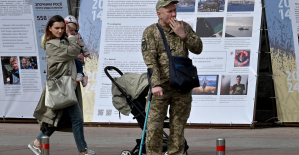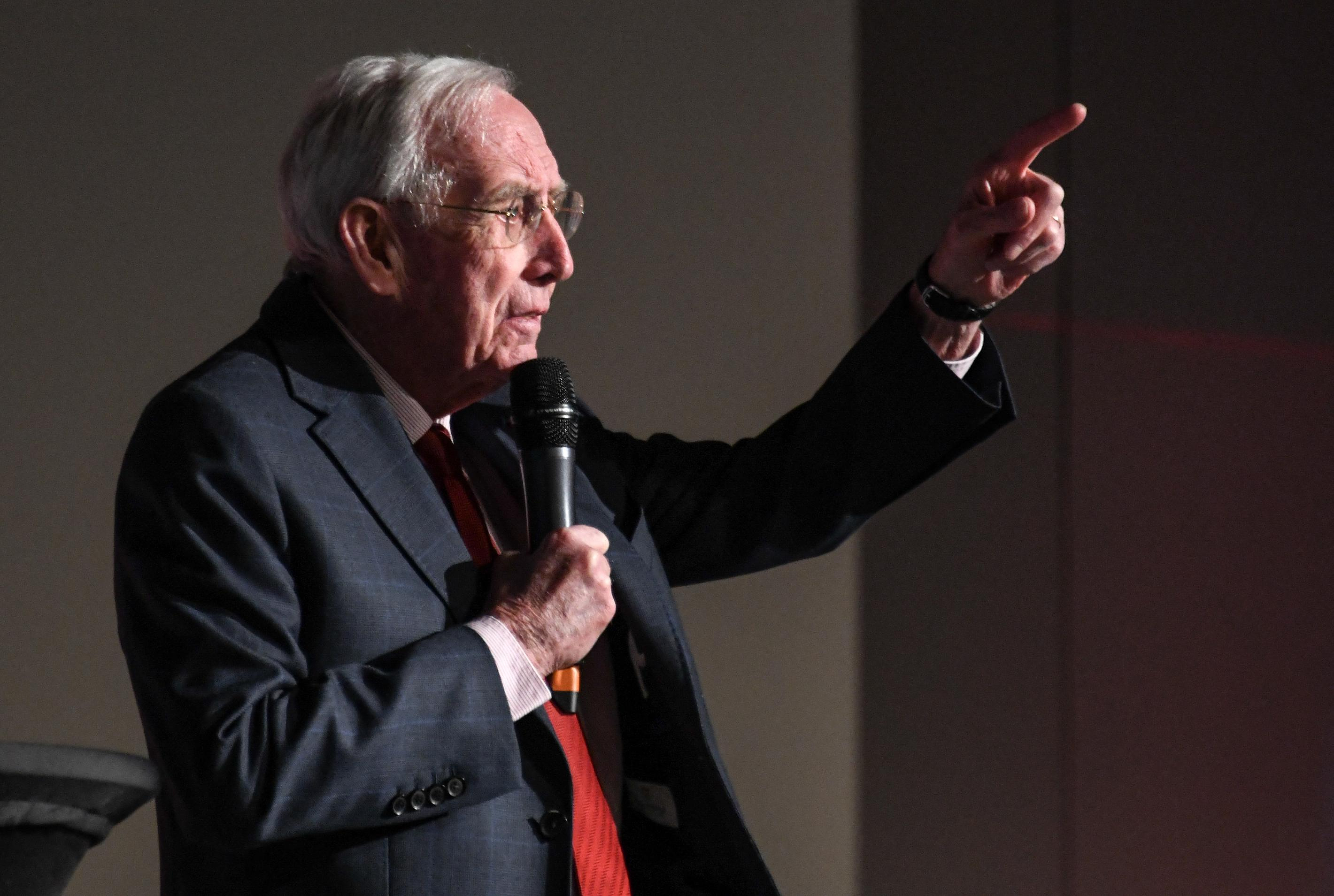The Shebab, a group affiliated with Al-Qaeda, has been fighting the government since 2007 to establish Islamic law. Driven out of the main cities in 2011-2012, they remain firmly established in vast rural areas.
. Who fights the Shebab?
Since July, two clans in the regions of Galmudug and Hirshabelle, in central Somalia, have been fighting to free themselves from pressure from local Al-Shabaab.
The government decided to send the army at the beginning of September, including the "Danab" commandos trained by the American army, to support these clan militias baptized "macawisley" - from the name of the traditional sarong ("macawis") worn by some of these civilian fighters.
"The government wants to grasp the current dynamic and encourage this type of uprising in areas under Shebab control," said Omar Mahmood, researcher at the International Crisis Group.
The number of soldiers involved in this major offensive is not known. For the "macawisley", local sources mention 2,000 to 3,000 fighters. Shebab numbers are estimated at between 5,000 and 8,000 across the country.
With the support of American air strikes and logistical and artillery support from the African Union force (Atmis), these troops regained control of the province of Hiran and large areas of Middle Shabelle.
. What is the government's strategy?
In mid-July, the new president Hassan Cheikh Mohamoud had detailed a strategy on "three fronts": military, ideological and economic.
"Previous policies were militaristic: attack and destroy. But the Shebab problem is more than military," he explained.
His first action was the appointment as Minister of Religious Affairs of Muktar Robow, one of the founders of the movement he left in 2017. Since then, Robow and the government have been working to "take back the narrative of Islam from the shebab", referred to as "khawarij" ("renegades").
In an attempt to "close the financial taps" of the movement, the government also announced that any trade paying the "taxes" demanded by the Shebab would see its license revoked.
Its American ally announced to offer up to 10 million dollars for any information allowing "the disruption of the financial mechanisms".
"The government is trying to establish a climate of confidence in the population so that it stands up against the group. It is still difficult to measure the effects of these declarations", underlines Samira Gaid, of the Hiraal Institute specialized in questions of security.
. What is the reaction of the Shebab?
In the center of the country, the Shebab have lost ground. But they generally have long-term strategies, recalls Omar Mahmood: "Even if they lose in the short term, they will try to find ways to undermine the progress of the government in order to be able to come back".
They recently reinvested some localities abandoned by the federal troops in their advance.
At the same time, the group is carrying out a campaign of bloody attacks in cities.
On October 29, Somalia suffered its deadliest attack since 2017, with 121 dead and 333 injured in a double car bomb attack in Mogadishu.
If these bloody attacks are frequent with each change of administration, they also respond to an "existential" threat to the Shebab, underlines Samira Gaid: "They react strongly to repel it and dissuade other clans from joining the fight".
. Is a "liberation" of the country possible?
Hassan Cheikh Mohamoud said in mid-November that "going back or defeat is not an option". But the promised "liberation of the country" will be punctuated by major challenges.
"The most difficult thing is not to regain ground", underlines Omar Mahmood: "the most difficult thing is to hold these territories, that the government is present, that it protects the population and provides services so that they see the advantages of being under his authority".
History has shown that without authority, clan rivalries resurface and the Shebab return. Clashes between clans have recently been reported in some "liberated" areas.
Since the government did not initiate the offensive itself, "it seems that post-liberation planning is secondary", laments Omar Mahmood: "the government seems more focused on expanding the offensive".
Extending it to other regions will not be easy. The clans play a capital role in the current offensive but it is not certain that all will do the same, especially in the south, a historic Shebab stronghold.
For 15 years, all attempts to eliminate the Islamist group militarily have failed.
Hassan Cheikh Mohamoud said in July that "there are strong arguments" for negotiations. But "we are not currently in a position to negotiate with the Shebab. We will do so at the right time," he said.
For Samira Gaid, "it has always been clear to the government that a negotiation could only take place in a favorable position". The current offensive may help "give the advantage to the government before talks later."

 Poland, big winner of European enlargement
Poland, big winner of European enlargement In Israel, step-by-step negotiations for a ceasefire in the Gaza Strip
In Israel, step-by-step negotiations for a ceasefire in the Gaza Strip BBVA ADRs fall almost 2% on Wall Street
BBVA ADRs fall almost 2% on Wall Street Ukraine has lost 10 million inhabitants since 2001... and could lose as many by 2050
Ukraine has lost 10 million inhabitants since 2001... and could lose as many by 2050 Sánchez cancels his agenda and considers resigning: "I need to stop and reflect"
Sánchez cancels his agenda and considers resigning: "I need to stop and reflect" The Federal Committee of the PSOE interrupts the event to take to the streets with the militants
The Federal Committee of the PSOE interrupts the event to take to the streets with the militants Repsol: "We want to lead generative AI to guarantee its benefits and avoid risks"
Repsol: "We want to lead generative AI to guarantee its benefits and avoid risks" Osteoarthritis: an innovation to improve its management
Osteoarthritis: an innovation to improve its management Ukraine gets a spokesperson generated by artificial intelligence
Ukraine gets a spokesperson generated by artificial intelligence The French will take advantage of the May bridges to explore France
The French will take advantage of the May bridges to explore France Organic flour contaminated by a recalled toxic plant
Organic flour contaminated by a recalled toxic plant 2024 Olympics: Parisian garbage collectors have filed a strike notice
2024 Olympics: Parisian garbage collectors have filed a strike notice Death of Paul Auster: Actes Sud says he is “lucky” to have been his publisher in France
Death of Paul Auster: Actes Sud says he is “lucky” to have been his publisher in France Lang Lang, the most French of Chinese pianists
Lang Lang, the most French of Chinese pianists Author of the “New York Trilogy”, American novelist Paul Auster has died at the age of 77
Author of the “New York Trilogy”, American novelist Paul Auster has died at the age of 77 To the End of the World, The Stolen Painting, Border Line... Films to watch this week
To the End of the World, The Stolen Painting, Border Line... Films to watch this week Omoda 7, another Chinese car that could be manufactured in Spain
Omoda 7, another Chinese car that could be manufactured in Spain BYD chooses CA Auto Bank as financial partner in Spain
BYD chooses CA Auto Bank as financial partner in Spain Tesla and Baidu sign key agreement to boost development of autonomous driving
Tesla and Baidu sign key agreement to boost development of autonomous driving Skoda Kodiaq 2024: a 'beast' plug-in hybrid SUV
Skoda Kodiaq 2024: a 'beast' plug-in hybrid SUV The home mortgage firm rises 3.8% in February and the average interest moderates to 3.33%
The home mortgage firm rises 3.8% in February and the average interest moderates to 3.33% This is how housing prices have changed in Spain in the last decade
This is how housing prices have changed in Spain in the last decade The home mortgage firm drops 10% in January and interest soars to 3.46%
The home mortgage firm drops 10% in January and interest soars to 3.46% The jewel of the Rocío de Nagüeles urbanization: a dream villa in Marbella
The jewel of the Rocío de Nagüeles urbanization: a dream villa in Marbella Europeans: a senior official on the National Rally list
Europeans: a senior official on the National Rally list Blockade of Sciences Po: the right denounces a “drift”, the government charges the rebels
Blockade of Sciences Po: the right denounces a “drift”, the government charges the rebels Even on a mission for NATO, the Charles-de-Gaulle remains under French control, Lecornu responds to Mélenchon
Even on a mission for NATO, the Charles-de-Gaulle remains under French control, Lecornu responds to Mélenchon “Deadly Europe”, “economic decline”, immigration… What to remember from Emmanuel Macron’s speech at the Sorbonne
“Deadly Europe”, “economic decline”, immigration… What to remember from Emmanuel Macron’s speech at the Sorbonne These French cities that will boycott the World Cup in Qatar
These French cities that will boycott the World Cup in Qatar Top 14: Fijian hooker Narisia leaves Racing 92 and signs for Oyonnax
Top 14: Fijian hooker Narisia leaves Racing 92 and signs for Oyonnax Europa League: Jean-Louis Gasset is “wary” of Atalanta, an “atypical team”
Europa League: Jean-Louis Gasset is “wary” of Atalanta, an “atypical team” Europa League: “I don’t believe it…”, Gasset jokes about Aubameyang’s age
Europa League: “I don’t believe it…”, Gasset jokes about Aubameyang’s age Foot: Rupture of the cruciate ligaments for Sergino Dest (PSV), absent until 2025
Foot: Rupture of the cruciate ligaments for Sergino Dest (PSV), absent until 2025
















